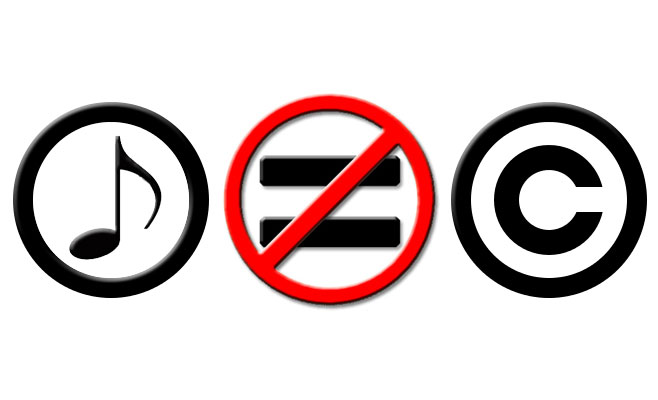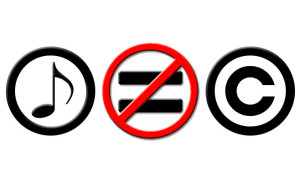

Imagine a world in which there is only bottled water. Then, quite rapidly, changes in technology connect every household to a municipal water line so they can have tap water.
Suddenly, you don’t have to pay for water every time you want to drink it. And even though you’re paying a small monthly fee for access to the municipal water line
This is what’s happening in music. We’re hooking up and turning on the taps. We’re reclaiming the water as a public resource.
Recently there was a putrid click-bait post on Digital Music News titled “Why Streaming Music Isn’t Like Bottled Water“. It’s part of a trend — albeit a trend quarantined to snarky music bloggers and obscurity-fearing professional musicians — to paint streaming services as the great evil.
What bothers me the most about knee-jerk demonization of tech companies is that record labels are really the ones to blame. It was the labels that used lawyers and lobbyists to bring copyright under corporate control. Don’t hate the industry that’s trying to make it more fair!
I would agree it’s naive to think tech companies would have anything but their bottom lines in mind when it comes to decision-making, just like the corporate oligarchy controlling music copyrights. Nonetheless, look at all the great music that has come out of the labels despite them being largely evil empires. The same will be true of tech companies, but they still have a long ways to go before they can compete with the unabashed exploitation of musicians at the hands of the labels. Remember McLuhan: “The medium is the message.”
Sure, making music more fair means the 1% of musicians who earn 95% of the profits in the music industry are going to have to take a hit to their paycheck. That’s the shift caused by technology in many corners of society, in music it is embodied by the streaming services. The record labels are the ones who want to see the 1% hold on to their money, because they collect over 50% of their revenue before it makes it to the artist! Who’s screwing who?
Back to bottled water. It’s been a popular thing for technologists to say that “music is like water” because… well… it is. It’s kind of common sense and obvious. Tens of thousands of people have agreed. This is why the click-bait trolling article was written in the first place, like a kid kicking a bees’ nest.
If you visit the link, you’ll notice I started to refute the article point by point before getting overwhelmingly bored. I’ve been fighting against the trolls who demonize the music tech industry for years. It’s getting tiresome. What’s more, the world I talk about — the world in which music flows like water — is already here. We’re never going to regress back into the world that the copyright maximalist musicians are trying to complain us back to. This much is clear in their total lack of advancing any workable solutions for increasing the value around music.
Here’s the problem: Musicians (and many others) are confusing copyright with music.
Music is Free
If you don’t understand why music is free, please take a second to hum a song. Now try to put a price tag on it. You can’t. You need some sort of way of gatekeeping access to that song in order to create value around it. There are two ways: build a fence to keep people out, or build a fence to keep people in.
Copyright is the fence built to keep people out. Patronage is the fence built to keep people in.
Copyright Productizes Music
Copyright has been the way we’ve generated value around music for roughly 200 years, first by protecting sheet music, but most importantly by protecting the song recording. For the first time in the music business, the gates didn’t have to be physical to create value around song. Prior to the invention of the recording, the only way to create value around music was to attract patronage — the main way of doing so was to be paid for a performance. The way to create value in a performance is to charge those who pass through the entrance. The gates were physical and literal.
With copyright, the gates became more like music — ineffable, conceptual. Over time, listeners and musicians were brainwashed by the copyright industry to combine copyright and music into a single concept — “sonic product” — the idea of music as a product to be packaged and sold like any other consumer good. The free music, like that on the radio or TV, was just promotion for the sale of the product — a free sample.
But the product of music isn’t like consumer packaged goods. The “packaging” is copyright, a law that you can’t touch, smell, taste or hear.
That’s where the bottled water analogy comes in.
Streaming music is tap water in a world where bottled water used to be the only choice. Oh sure, you can saddle up to the water fountain of radio, or the office cooler of music television. But to have on-demand access to the water that you want, a bottled-water system makes no sense when tap water technology is here. Sure, plenty of listeners will continue buying bottled water because of its perceived convenience or quality, the rest of us are thirsty and just want a drink.
We’re undergoing the same kind of fundamental shift that happened when music moved from performance to recording, from patronage to copyright.
Of course, the multibillion-dollar bottled water will fight with all its might to protect its profits. This is the true crisis in music — corporations ruining music just for profit. Tech companies are also trying to profit, but they’re doing it by building walls that keep people in, not walls that keep people out. The tech industry is building the music taps, the listeners want it, the musicians want it — only the bottled water industry wants to fight it. Unfortunately, the bottled water industry (and the labels) have lots of money and lawyers to ruin society with!
We need to stop confusing copyright with music. Music exists independently from the access-control mechanisms we use to create value around it. This is not to say the forces of business and technology have no role in shaping music. Quite the opposite is true — we tend to underestimate just how much commerce and technology shape creativity.
But when it comes time to talk about what music really is, the cacophony of music bloggers and complaining professional musicians drowns out the truth.
Music is like water. It’s a free but precious resource necessary for human life that must be maintained and made fairly accessible for humanity to progress. And like water, it is constantly under threat of corporate control for the best interest of the corporation, not society.
The record labels are the water bottlers. You pay a premium, and you feel it in your wallet every time.
The streaming services are the tap. You pay a small monthly fee, and metering makes sure the costs and revenues are evenly distributed.
But guess what? The water analogy doesn’t stop there. Do you see the ocean?
In the music analogy, the ocean is the sea of musicians — the majority of musicians — who don’t make a penny playing music. Forget money, they don’t even get a chance to be heard.
Right now, the sea is undrinkable unless you build an expensive system to filter it. This is exactly where the music industry is right now. We’re trying to figure out a way to filter the millions of musicians playing across the world and deliver something of value to the listener. Or, in water terms, we’re trying to desalinize the ocean.
We’ve come to define the hit song as the pinnacle of music, but that’s not true. The pinnacle of music is in every musician being heard, whether it’s by one person or one million. We’re getting there, and it starts with moving past the bottled water industry.
Even as mainstream culture grows even more monolithic, one by one, people are waking up to this new way of thinking about how we create value around what we create. Control is moving from the corporation back to the individual as profit takes a backseat to community. Music isn’t a product to be sold, it’s a service we provide to each other.
It’s the most exciting time to be a musician… and it’s a pretty exciting time to be a human in general.
So pour yourself a nice, tall glass of tap water and toast to the future of music, where all musical thirsts are quenched!
